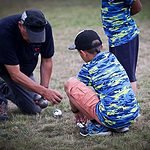When it comes to Spikeball, whether you choose to practice serves and volleys solo in your backyard or engage in fierce matches with friends at the beach, each scenario presents its own unique advantages and drawbacks.
Playing alone allows you to focus on refining your techniques and strategies, but the camaraderie and shared excitement of team play can add a whole new dimension to the game.
So, which path will you choose for your next Spikeball session?
Key Takeaways
- Solo play offers individual skill improvement and flexibility.
- Group play enhances teamwork, communication, and social dynamics.
- Both options have unique benefits for skill development and gameplay experience.
- Solo play focuses on personal growth, while group play emphasizes social interaction and synergy.
Benefits of Playing Spikeball Alone
Improving your Spikeball skills and enhancing your coordination can be efficiently achieved through solo play, offering a myriad of benefits for both physical fitness and gameplay proficiency. When playing alone, you have the opportunity to focus on honing specific techniques such as mastering the drop shot or improving your serve accuracy without the pressure of a competitive match. This concentrated practice can elevate your game to the next level, allowing you to refine your skills at your own pace.
Furthermore, solo Spikeball sessions provide a chance to engage in a full-body workout that challenges your agility, hand-eye coordination, and cardiovascular endurance. By dedicating time to playing alone, you can boost your reaction time and overall gameplay performance. Additionally, for players struggling to find partners or coordinate group games, solo play offers a convenient alternative to stay active and connected to the sport.
As you continue to practice solo, consider recording your sessions to analyze your gameplay, track your progress, and even share highlights with others via email or social media.
Drawbacks of Playing Spikeball Alone
What impact does playing Spikeball alone have on your overall gaming experience and skill development?
Playing Spikeball solo comes with its drawbacks that can affect your enjoyment and progress in the game. One significant downside is the absence of the competitive and social elements that are present in multiplayer games. Without a partner, you miss out on the opportunity to develop essential teamwork, communication, and strategy skills that are crucial in Spikeball.
Additionally, setting up and practicing specific plays or strategies can be challenging when you're on your own, limiting your ability to explore different tactics fully. Furthermore, playing alone may lead to quicker fatigue and a less dynamic gameplay experience compared to playing with others.
The joy of celebrating points and victories with a partner is also missing in solo play, which can make the overall experience less fulfilling. To truly excel in Spikeball, it's beneficial to engage in multiplayer games to enhance your skills and enjoyment of the game.
Advantages of Playing Spikeball With Others
When playing Spikeball with others, you can experience a heightened sense of teamwork and communication, essential for maximizing your gameplay potential. Team dynamics play a crucial role in multiplayer games, allowing for strategic plays and coordinated efforts that can lead to more successful outcomes. By working together with your teammates, you can develop and enhance your communication skills, learning to effectively convey strategies and coordinate movements on the Spikeball court.
Moreover, playing Spikeball with others offers a unique opportunity for social interaction. The camaraderie built through shared experiences on the field can strengthen bonds and create lasting memories. The competitive spirit and friendly rivalries that often emerge in multiplayer games can make the gameplay more engaging and exciting, pushing you to improve your skills while having fun with friends or family members. In essence, the advantages of playing Spikeball with others extend beyond the game itself, enriching your overall experience through teamwork, communication, and social connections.
Disadvantages of Playing Spikeball With Others
While playing Spikeball with others can offer numerous benefits, there are also drawbacks to consider that may impact your overall experience with the game. Challenges such as coordination and communication with a partner are essential but can be difficult for some players, leading to frustration and potential conflicts during gameplay. Disagreements or misunderstandings with a partner can result in a breakdown in teamwork, affecting the enjoyment of the game for both players. Additionally, varying skill levels between partners may create an uneven match, causing frustration for the less skilled player and hindering the overall gameplay experience. Finding a reliable partner for regular play can also be challenging, leading to inconsistent game experiences and potential disruptions in your Spikeball sessions. Moreover, dependency on a partner may limit your individual skill development, inhibiting personal growth in the game and preventing you from reaching your full potential.
| Challenges | Communication | Teamwork |
|---|---|---|
| Coordination issues | Disagreements | Unequal skill levels |
| Finding partners | Misunderstandings | Breakdowns |
| Skill disparities | Inconsistencies | Dependency |
Solo Spikeball: Pros and Cons
Considering the challenges that come with playing Spikeball with others, exploring the realm of Solo Spikeball reveals a unique set of pros and cons worth examining. When engaging in Solo Spikeball, you have the opportunity to focus on skill improvement and enhance your hand-eye coordination. This individual play allows for flexible scheduling, giving you the freedom to practice at your convenience without having to coordinate with others.
Moreover, Solo Spikeball can be a great way to concentrate on your individual development and strategic gameplay. By strategizing and playing alone, you can delve deeper into the game's intricacies and work on honing your techniques.
However, playing Spikeball alone may present some drawbacks. The limited competition could potentially hinder your progress, as facing different skill levels can push you to improve. Additionally, the gameplay might lack the dynamic element that comes with playing against others, potentially reducing the excitement and challenge of the game.
Despite these cons, Solo Spikeball remains a valuable avenue for personal growth and skill enhancement.
Group Spikeball: Pros and Cons
Engaging in Group Spikeball introduces a collaborative dynamic that enhances teamwork and communication skills while fostering a sense of camaraderie among players. In a group setting, the game transcends mere physical activity; it becomes a platform for developing crucial life skills. Team strategy plays a pivotal role, requiring coordinated efforts, quick thinking, and adaptability. Through strategizing together, players learn the value of cooperation and the impact of individual contributions on the team's overall performance.
Communication skills are honed as teammates must effectively convey their intentions, positioning, and tactics during gameplay. Clear and concise communication is the cornerstone of successful team play in Spikeball, translating directly to real-world scenarios where effective communication is essential. Moreover, the social bonds forged on the Spikeball court often extend beyond the game itself, leading to lasting friendships and a sense of belonging within the group. The shared experiences, victories, and challenges encountered while playing Group Spikeball create a strong foundation for building meaningful connections with others.
Playing Spikeball Alone: The Good and the Bad
Playing Spikeball alone offers a unique opportunity for individual skill enhancement and focused practice sessions. When practicing solo, you have the chance to work on specific skills, address personal weaknesses, and refine techniques without distractions. However, playing alone may lack the intensity and competitiveness that comes with playing against others. While solo play can be convenient when a partner is unavailable, it also means missing out on the social interaction and team dynamics that make Spikeball enjoyable.
To better illustrate the pros and cons of playing Spikeball alone, consider the following table:
| Pros | Cons |
|---|---|
| Improving Skills | Lack of Social Interaction |
| Solo Focus | Limited Intensity |
| Personal Growth | Missing Team Dynamics |
Playing Spikeball With Others: a Balanced Perspective
With a focus on teamwork and communication skills, playing Spikeball with others elevates the social dimension of the game while enhancing strategic thinking and overall gameplay. Team dynamics play a crucial role in Spikeball, where collaborating with teammates can lead to strategic advantages. By engaging in competitive matches against others, players not only improve their gameplay but also hone their strategic thinking skills. The social interaction during Spikeball games fosters camaraderie among teammates, providing a sense of shared victories and defeats that build a strong team bond. This camaraderie not only enhances the overall experience but also gives players a competitive edge as they learn to work together effectively.
Furthermore, playing with others in Spikeball creates a dynamic environment that challenges players to adapt and strategize in real-time. This unpredictability leads to more creative plays and coordinated efforts, ultimately raising the level of play for everyone involved. Embracing the collaborative nature of Spikeball not only enriches the gameplay experience but also nurtures essential communication skills and sportsmanship values.
The Upsides of Solo Spikeball Play
Amidst the collaborative dynamics of team play in Spikeball, exploring the benefits of solo Spikeball play unveils a realm of personal growth and skill development. Engaging in solo Spikeball sessions offers a unique opportunity for individual improvement.
By playing alone, you can focus on honing specific skills like ball control and serving techniques. The flexibility in scheduling practice sessions allows you to tailor your training to address your weaknesses effectively.
Moreover, solo Spikeball play serves as an excellent workout, demanding that you cover the entire court yourself. This not only enhances your fitness level but also improves your strategic thinking and decision-making skills during gameplay. The solitude of solo play provides an environment where you can concentrate without distractions, leading to improved focus.
Through consistent solo practice, you can witness significant personal growth as you challenge yourself to overcome obstacles and refine your Spikeball abilities.
Considerations for Group Spikeball Games
Considering the dynamics and benefits of group play in Spikeball, one must acknowledge the invaluable aspects that teamwork and social interaction bring to the game. In group settings, team dynamics and strategy play a crucial role in achieving success on the Spikeball court. Communication and coordination among players are essential for executing plays effectively and outsmarting the opposing team. These group dynamics not only enhance the competitiveness of the game but also make it more enjoyable and engaging for all participants. Furthermore, the social interaction and camaraderie fostered during multiplayer Spikeball matches create a sense of belonging and unity among players. This bonding experience not only strengthens relationships but also encourages continuous improvement and support within the team. The table below summarizes the key considerations for group Spikeball games:
| Considerations | Description |
|---|---|
| Team Dynamics | Essential for success, cooperation, and synergy |
| Communication | Vital for coordinating plays and strategies |
| Social Interaction | Fosters camaraderie, bonding, and a supportive environment |





